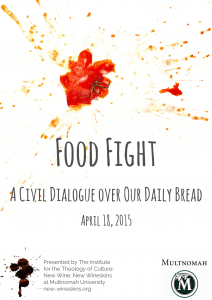![121203-P-Warren-Buffett-to-the-Rescue-300x226[1]](https://wp-media.patheos.com/blogs/sites/307/2014/02/121203-P-Warren-Buffett-to-the-Rescue-300x2261.jpg)
Seemingly, America can make anything, but do we know how to distribute it? How about food distribution and equality? I wonder what Sitting Bull would say today over the state of America’s growing food inequities. A September 2014 Washington Post article addresses “America’s growing food inequality problem.” The article highlights a study titled “Trends in Dietary Quality Among Adults in the United States, 1999 Through 2010” in The Journal of the American Medical Association Internal Medicine. Among other things, the newspaper article notes that the price gap between healthy and less healthy foods, growing income gap, and likely knowledge gap among the poor (who might have less occasion to learn about the problems associated with unhealthy foods and diets[1]), are factors that contribute to the inequity problem. In closing, the article claims,
No matter the cause, the gap is marginalizing a significant portion of the population. “In America, food has become the premier marker of social distinctions, that is to say—social class. It used to be clothing and fashion, but no longer, now that ‘luxury’ has become affordable and available to all,” Adam Drewnowski, an epidemiologist at the University of Washington, told Newsweek back in 2010.
There now seems to be further statistical truth to back up that claim.
What does it say about our society that we have markers for social distinctions, especially if and when food becomes the “premier marker”? What do we make of our social status as a country, if we do not make every effort to overcome this widening gap?
I can only imagine what Sitting Bull would think of such social distinctions and America’s social status. He stands as a stark contrast or perhaps a prophetic complement to the “Charging Bull” of Wall Street, which symbolizes “virility and courage” and America’s “can-do spirit” (Refer to the story behind the making of Wall Street’s “Charging Bull”). Perhaps we should build a statue to Sitting Bull and place it next to the Charging Bull as a symbolic reminder that we must do everything possible to distribute healthy food to the whole of our society and beyond.
What can we do with our “can-do spirit” as Americans to overcome the obstacles that stand in the way of food equity? Going further, how does the “will-do” Spirit of God who elevates Jesus, as he gives good gifts to the poor (Matthew 14:13-21; Mark 6:30-44; Luke 9:10-17; John 6:1-11), inspire and lead the church to make a difference in this way in America and abroad?
Please join us for New Wine, New Wineskins’ conference on food scheduled for April 18th at Multnomah University in PDX titled “Food Fight—A Civil Dialogue Over Our Daily Bread.” See here for the blog post by this title. We will reflect upon food distribution, quality of food, related themes of food justice, and a theology of food. 
[1]I would add that the knowledge-educational opportunity gap and income gap often feed off one another in American society.













